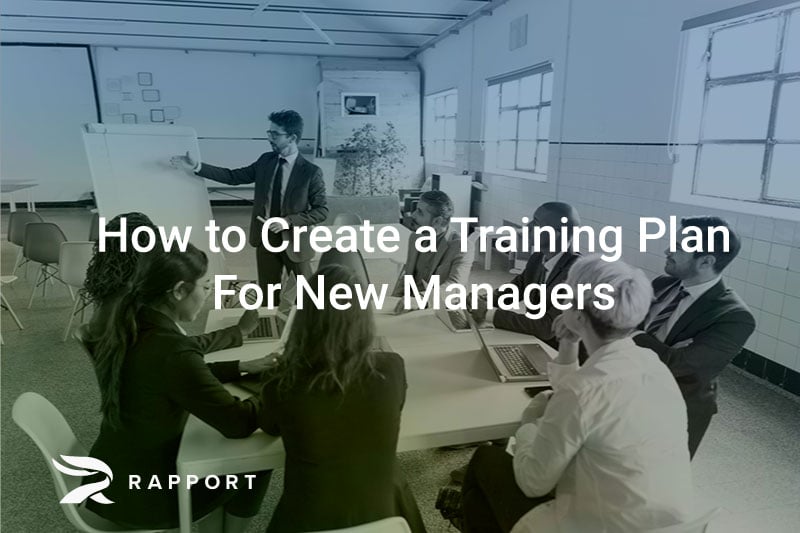How to Create a Training Plan For New Managers

Oftentimes, an employee is promoted to a managerial position for good reason — they excel at their current job. They are a high performer, provide top-notch customer service, and stand out from their co-workers in both their attitude and their achievements.
That’s a great reason to promote an employee, but it doesn’t take one very important thing into account: A manager wears a lot more hats than their employees. While they may still be responsible for some of the work, they are also responsible for leading a team, inspiring the troops, and creating a positive culture where their team members will flourish.
Companies incorrectly assume that because they excelled as an employee, this individual will excel as a leader. Unfortunately, many organizations overlook the need to create a training plan for managers.
Why do companies skip this incredibly crucial step? Sometimes, an organization doesn’t know how to properly train new managers. Sometimes, they don’t see the importance of providing a training plan for managers.
Thankfully, as a learning and development leader, you have the power to create a proper management training program so that your leaders are equipped to succeed. Throughout this blog post, you’ll find a number of helpful strategies to guide you in your development and implementation.
Why Your Company's Performance Depends on Management Training
In every organization, attitude and culture begin at the top and trickle down to the frontline workers. With approximately 2 million individuals promoted to management roles each year and not nearly enough managerial training devoted to these people, an organization’s culture is in constant jeopardy.
When an employee is promoted to manager, yet unprepared to take on this responsibility, it leads to frustration for the new manager (not to mention everyone who works with or for them), low productivity, poor performance, high turnover, and, ultimately, failure for the person and the company.
Earlier, we discussed that being a manager is more than doing the day-to-day tasks in their previous role. Management development encapsulates three main topics that every leader must learn. These include: goal creation, delivering feedback, and coaching employees.
Learning Styles For Millennial Managers
As younger individuals move up through the ranks in their organizations, the workforce is seeing an average age of 30-years-old for first-time managers. In fact, it’s estimated that by 2025, millennials will make up 75 percent of the workforce.
While it’s great news that millennials are being promoted, it has posed a challenge for traditional training styles. In the past, PowerPoint ruled the training landscape. But millennial managers require a different type of training to truly thrive. They want training that is:
- Customized to their personality, role in the organization, and their experience. This is why coaching works so well.
- Continuous. Millennials want to grow and consider themselves a constant work-in-progress.
- Mobile. A generation that is used to the world’s knowledge at their fingertips needs on-the-go training.
- On-demand, because they are busy, used to constant stimulation, and have no desire to spend hours upon hours in a training classroom.
7 Steps to Create a Training Plan For Your Company's New Managers
Now that you understand how imperative training and development programs are to set your new managers up for success, it’s time to dive into how you implement a training plan for managers in your organization.
Conduct Personality And Skill Assessments of Current Managers
In order to determine your course of training, you need to identify where your managers currently fall. What skills do they possess? In what areas do they need assistance? This is not only important for you to discover where the gaps are, but it’s also important for the employee to understand their own strengths and weaknesses.
Predict Future Management Competencies
Leaders need specific skills and competencies to do their jobs, and your training plan for managers must reflect this. Take a good look at the role these new managers will fill and determine skills they need. Some of these may include providing effective feedback to their team, coaching individual employees on their performance, delegating tasks to free up their time to oversee the big picture, hosting productive one-to-one meetings, and making the leap from a front-line employee to a first-time manager.
Decide on Applicable Training Methods And Budget
There are endless possibilities when it comes to providing training for your employees. Understanding your budget first will help you decide on a number of factors and determine what method will be best for your organization. Will you send them to in-person trainings or utilize eLearning platforms? Do you want employees to undergo training together or can they learn separately? Will training be completed once or will there be opportunities for continued growth?
Research Knowledge Training Resources
While leadership training may look very similar from one organization to the next, knowledge training focuses on educating employees about the company they work for, the industry it falls under, and the specific products or services their company provides. This is an important part of the leadership and development training you must provide to maximize the manager’s comfort in their new role.
Research Skills Training Resources
Another important aspect of proper training is to identify the specific skills an employee needs to fulfill their role. Consider a head chef in an upscale restaurant. They’ll, of course, need to understand how to communicate effectively with their sous chef, line and prep cooks, understand the cuisine they are preparing, and reflect the theme of the restaurant. However, they also have to have the skills to cook. They need to know how to source ingredients, develop new dishes, and prepare meals quickly and efficiently. Consider what skills your employees need in their new roles.
Research Technology Training Resources
The final type of training you’ll need to consider when developing your training plan for managers is technology training. Continuing with the chef example, what sort of software program is in use within your company? A chef may have to utilize an order system to determine what he or she must prepare or may have to use a supplier’s system to place orders. Failure to provide adequate technology training can lead to major frustration and a breakdown within the department. Identify the software or hardware your employees must utilize and provide them with thorough training and support.
Select Courses
Selecting the training programs your new managers are enrolled in must be a strategic decision. While you might think “the more training, the better,” there comes a time when information becomes overwhelming and detrimental.
Rather than choosing random courses, identify the skills your new managers will need and base your choices on those. You should also include training that reestablishes your company’s culture and takes your mission and vision into account.
Rapport U is an excellent choice for leadership and management training that will help build skills and confidence. Courses include delegation, emotional intelligence, communication, culture, and many more essential competencies.
More Tips to Keep in Mind When Crafting a Training Plan
Creating a training plan for managers does not need to be a stressful project. When you understand what needs to be communicated, who your audience is, and the best way to reach them, crafting the actual plan will be quite simple.
Let’s take a look at a few tips you can utilize to make your job easier and be more effective:
- Utilize personality profiles and indexes to create a unique experience based on who your employees are and how they best communicate and learn.
- Provide mobile training so employees can learn when it’s convenient for them.
- Focus on the different types of training necessary and pay special attention to the soft skills that will pay out over an employee’s entire career.
- Utilize a cycle of “training-application-assessment-training,” rather than the “drinking from a firehose approach,” where all the information is given at once.
Turn Your New Managers Into Strong Leaders With Rapport University
While you can always provide extra training once an employee is established in their role, there is no better time to train them properly and give them the tools they need to thrive, than when they are stepping into their new position. Provide the right training with Rapport U and give them the leg up they need to succeed!


